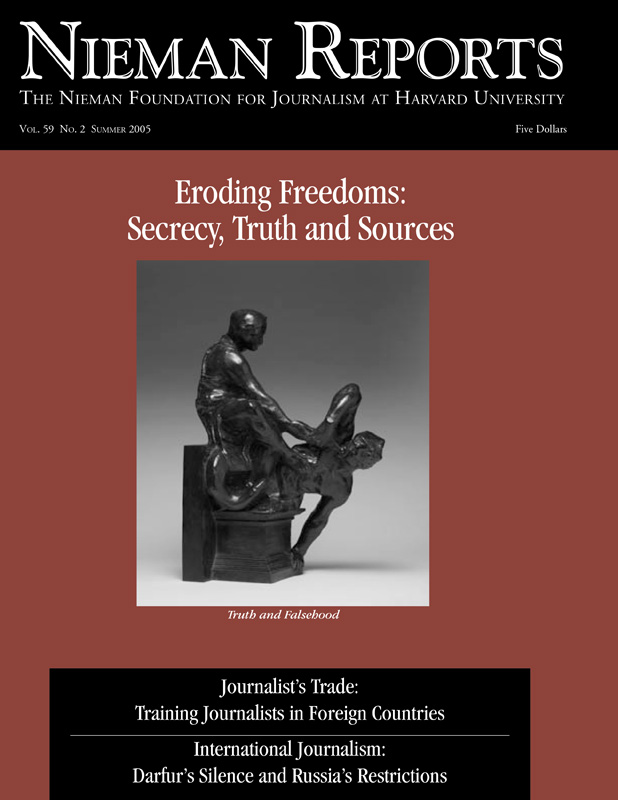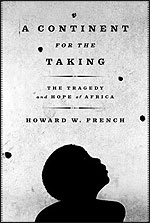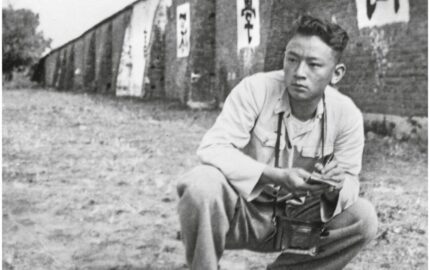When American journalists are posted to sub-Saharan Africa—to bureaus in Nairobi, Johannesburg or Abidjan—they confront very quickly human evidence of the daunting reality of just how wide the social and economic gap is between the United States and these countries that will constitute their new beat. Even before they arrive, a quick glimpse at figures available from the World Bank and United Nations has told them that more people in Africa live on less than one dollar a day than in any other part of the world, and 60 percent of the world’s people infected with HIV/AIDS live in Africa. Statistics have shown them that 34 of the world’s 48 poorest nations are in Africa and that 11 percent of the world’s population lives in this region but are responsible for only one percent of the global gross domestic product. And they’ve learned that the infrastructure is anemic, with just 13 percent of the roads paved and with only three percent of the people having access to a phone line or a cell phone.
Amid these dire circumstances—each of which unearths innumerable possibilities for stories—the foreign correspondent must, of course, report on major events when and where they happen. This can mean the demise of dictators, such as the 1997 fall from power of Mobutu Sese Seko, the longtime dictator of the Democratic Republic of the Congo, or in Nigeria, the recalcitrance of Sani Abacha, a brutal junta leader who tightens his grip on his government’s repression. Both stories demand coverage, but the approach a particular reporter takes to covering them will often be different. For one reporter, a news event might result in a feature story that—despite Africa’s immense problems—seeks to capture aspects of this situation that are odd, and perhaps even humorous, while another reporter might be more adept at digging behind the hard news.
No matter the approach taken, the question hovering over any story told from Africa is why what happens in the world’s poorest region should matter to readers in the West. And then there are some more sensitive questions. Can Africa news compete with the Iraq War or Asian tsunami? Have readers become accustomed to stories of misery from Africa and lost their ability to care? And how are editors to juggle these stories in the global mix of news offerings and budgetary constraints?
In the February/March issue of American Journalism Review, Sherry Ricchiardi, a senior writer for the publication, examined African coverage by the American media in some depth. Though she singled out some present journalists for their exceptional reporting on the Darfur crisis in the Sudan, her general conclusion was that the continent received far less attention than it deserved. “As the 10th anniversary of the Rwandan genocide was being observed in 2004,” she wrote, “news managers once again were under fire, this time for scant coverage of the bloodletting in Darfur, where millions have faced torture, starvation, rape and murder at the hands of the brutal Arab militias known as Janjaweed. Up to 70,000 have been killed.” [See stories about Darfur coverage on pages 111 and 113.]
After reading “A Continent for the Taking: The Tragedy and Hope of Africa,” by Howard W. French, a senior writer for The New York Times who served as the West and Central Africa bureau chief from 1994 to 1998, one realizes how difficult these questions are to answer. In his book French takes us along on his hectic journalistic journey through Africa, offers an unflinching look at his beat, and brings into focus an Africa that is unvarnished and compelling.
It is difficult to closely follow news reporting from Africa without paying particular attention to the correspondents who cover the continent for The New York Times, a newspaper with enormous influence and a long-standing commitment to coverage of this continent. But some of the Times’s correspondents stand out for what they’ve written, irrespective of their paper’s reputation, and French is one of them. The reporting he did on Mobutu’s downfall, for instance, earned him an Overseas Press Club award for best newspaper interpretation of foreign affairs. This change of power was a major milestone in Africa’s postcolonial history due to Mobutu’s 32-year reign, as well as his cunning ruthlessness, enormous wealth, amazing corruption, and close ties to Washington, and French’s reporting brilliantly wove these elements together.
More of a hard-news reporter than a features writer, French, in his dispatches, conveyed a captivating seriousness as he described a continent whose people were searching for a new definition of their place in the post-cold war world and where autocrats were facing intense pressure to step down. And as his tour wore on, the aftershocks of the Rwandan genocide reverberated far away from that tiny Eastern Africa nation into neighboring Congo and more distant Washington, D.C.. When he wrote for the Week in Review section— with leeway for reflection and the fewer constraints in pushing an argument—his insights about the continent seemed tailor-made for a student wanting to learn more about the reality of contemporary Africa.
These Week in Review articles brought out the best in French’s reporting by showcasing his abiding interest and ability in taking the continent’s measure through the illumination of a particular issue. The headlines were, at times, provocative: “Sure, Ebola Is Bad. Africa Has Worse;” “For Africa’s Dictators, No Exit Is Graceful;” “A Century Later, Letting Africans Draw Their Own Map,” and “Can African Democracy Survive Ethnic Voting?”
Readers familiar with French’s reporting will find this same incisiveness in his book. But more than that, in this book he shares his personal background—and how it affected his long-term relationship with this continent. “I had grown up in a strong African-American family, where pride and self-respect were passed on daily and in abundance—together with lots of history,” he writes. His father, a doctor, had lived in Cote D’Ivoire where he worked for the World Health Organization, and that is how French was introduced to Africa. In 1976, during summer vacation from college, he made his first visit and, after he graduated, he moved to what was then considered the Paris of Africa, Abidjan, the country’s then relatively well-developed, peaceful capital city. There he tried to figure out what to do next and found jobs as a freelancer, translator and professor. He joined the Times in 1986. His wife is African.
After the Rwandan Genocide
In “A Continent for the Taking,” French describes at great length how the Clinton administration played down the 1994 Rwandan genocide, which claimed 800,000 lives, in order to evade intervention after the politically costly deaths of 18 U.S. Rangers in Somalia a year earlier. French argues that in trying to compensate for its inaction the administration then got briefly active in the continent, but with deeply flawed and very costly policies. In telling this story, it is his contention that guilt, rather than genuine concern, should not be what drives U.S. foreign policy towards Africa.
Related to the Rwandan genocide is the internal rebellion that knocked Mobutu from power, and French’s account of it makes for fascinating reading. “For more than three decades, Mobutu was not just America’s best friend in Africa,” French writes, “he was a largerthan- life thief and scoundrel, a man who had bad guy written all over him just as clearly as the spots on his leopard-skin cap.” The familiar story line of Mobutu’s exit is that the Tutsi-led government that took over Rwanda, following the genocide, could not tolerate attacks from camps based in neighboring Congo. These camps contained Hutu killers who fled Rwanda after the genocide, then mixed in with genuine refugees. As a result, the Rwandan government organized a rebellion to get rid of the camps and Mobutu’s government.
But relying on a well-placed intelligence source, French suggests that the dictator’s removal most likely involved more that just the rebels of the Rwandanbacked Alliance of Democratic Forces for the Liberation of Congo-Zaire. The United States likely lent a hand—or even sponsored the rebellion—to oust a leader who had outlived his usefulness now that the cold war was over and Washington no longer needed to prop up leaders who claimed to be anti-Communist. Where French’s reporting and insights are most important is in helping us to understand that the Tutsis used the rebellion to also take revenge on the Hutu refugees for the genocide they’d committed in Rwanda against Tutsis and moderate Hutus. “As no American diplomat would, John [the pseudonym for his American intelligence source] acknowledged that this war was about one thing alone: counter-extermination,” French contends.
Though some Hutu refugees fought back, many were massacred, while the Clinton administration turned a blind eye. Half a million of these refugees simply fled on foot for hundreds of miles across the Congo, a vast country with dense forests. This saga, French observes, was hardly noticed by the rest of the world. To further complicate matters, the rebel government that replaced Mobutu in the Congo, led by Laurent Kabila, was grateful for the help it got from the Tutsis. And Kabila’s government prevented U.N. human rights investigators from visiting refugee camps or mass graves. “The United States provided political cover,” French explains, “blocking condemnation of the [Kabila] regime in the Security Council and lobbying for the slimmest possible accounting of the massacres.” Since the rebellion against Mobutu and the subsequent regional war—with neighboring countries either supporting rebels or the new government—an estimated 3.3 million people have died in the Eastern Congo alone. But he concedes that the figure is still being debated.
By the end of the book—and of his time in Africa—French admits to feeling burned-out, and he is ready to move on to another assignment for the Times, Tokyo. He confesses to have mixed feelings about his experience, and this should come as no surprise as readers follow his never-ending trail throughout West and Central Africa as he constantly traveled to tell stories and report on events.
For anyone with an interest in Africa, French’s book offers a valuable glimpse of the continent. Most U.S. newspapers rely on wire-service reports for their sub-Saharan Africa coverage, since only a few have full-time correspondents such as The New York Times (with three), The Washington Post (with two), and a few other major news outlets. Though he was better prepared to cover Africa than most other Western journalists, he insists that he still should have had more preparation. Western reporters in Africa get away with an ignorance that would not be tolerated if they were assigned to other world regions, he claims, and adds that U.S. reporters should not rely too heavily on “Western diplomats,” which is usually a euphemism for American diplomats. Sometimes these officials have no clue about what’s happening, and in the case of the Congo’s crisis, the country they represent was supporting one side while not willing to admit it.
One lesson, above all, remains paramount with French. He writes in the conclusion to his book, “In the process, though, I came to appreciate more than ever why it is wrong for us to push African news—and not just the riotously colorful features that one editor once described to me as the continent’s ‘oogah-boogah’—to the margins.” Those who read this book will arrive at this same appreciation.
Wilson Wanene is a Kenyan-born freelance journalist based in Boston.
Amid these dire circumstances—each of which unearths innumerable possibilities for stories—the foreign correspondent must, of course, report on major events when and where they happen. This can mean the demise of dictators, such as the 1997 fall from power of Mobutu Sese Seko, the longtime dictator of the Democratic Republic of the Congo, or in Nigeria, the recalcitrance of Sani Abacha, a brutal junta leader who tightens his grip on his government’s repression. Both stories demand coverage, but the approach a particular reporter takes to covering them will often be different. For one reporter, a news event might result in a feature story that—despite Africa’s immense problems—seeks to capture aspects of this situation that are odd, and perhaps even humorous, while another reporter might be more adept at digging behind the hard news.
No matter the approach taken, the question hovering over any story told from Africa is why what happens in the world’s poorest region should matter to readers in the West. And then there are some more sensitive questions. Can Africa news compete with the Iraq War or Asian tsunami? Have readers become accustomed to stories of misery from Africa and lost their ability to care? And how are editors to juggle these stories in the global mix of news offerings and budgetary constraints?
In the February/March issue of American Journalism Review, Sherry Ricchiardi, a senior writer for the publication, examined African coverage by the American media in some depth. Though she singled out some present journalists for their exceptional reporting on the Darfur crisis in the Sudan, her general conclusion was that the continent received far less attention than it deserved. “As the 10th anniversary of the Rwandan genocide was being observed in 2004,” she wrote, “news managers once again were under fire, this time for scant coverage of the bloodletting in Darfur, where millions have faced torture, starvation, rape and murder at the hands of the brutal Arab militias known as Janjaweed. Up to 70,000 have been killed.” [See stories about Darfur coverage on pages 111 and 113.]
After reading “A Continent for the Taking: The Tragedy and Hope of Africa,” by Howard W. French, a senior writer for The New York Times who served as the West and Central Africa bureau chief from 1994 to 1998, one realizes how difficult these questions are to answer. In his book French takes us along on his hectic journalistic journey through Africa, offers an unflinching look at his beat, and brings into focus an Africa that is unvarnished and compelling.
It is difficult to closely follow news reporting from Africa without paying particular attention to the correspondents who cover the continent for The New York Times, a newspaper with enormous influence and a long-standing commitment to coverage of this continent. But some of the Times’s correspondents stand out for what they’ve written, irrespective of their paper’s reputation, and French is one of them. The reporting he did on Mobutu’s downfall, for instance, earned him an Overseas Press Club award for best newspaper interpretation of foreign affairs. This change of power was a major milestone in Africa’s postcolonial history due to Mobutu’s 32-year reign, as well as his cunning ruthlessness, enormous wealth, amazing corruption, and close ties to Washington, and French’s reporting brilliantly wove these elements together.
More of a hard-news reporter than a features writer, French, in his dispatches, conveyed a captivating seriousness as he described a continent whose people were searching for a new definition of their place in the post-cold war world and where autocrats were facing intense pressure to step down. And as his tour wore on, the aftershocks of the Rwandan genocide reverberated far away from that tiny Eastern Africa nation into neighboring Congo and more distant Washington, D.C.. When he wrote for the Week in Review section— with leeway for reflection and the fewer constraints in pushing an argument—his insights about the continent seemed tailor-made for a student wanting to learn more about the reality of contemporary Africa.
These Week in Review articles brought out the best in French’s reporting by showcasing his abiding interest and ability in taking the continent’s measure through the illumination of a particular issue. The headlines were, at times, provocative: “Sure, Ebola Is Bad. Africa Has Worse;” “For Africa’s Dictators, No Exit Is Graceful;” “A Century Later, Letting Africans Draw Their Own Map,” and “Can African Democracy Survive Ethnic Voting?”
Readers familiar with French’s reporting will find this same incisiveness in his book. But more than that, in this book he shares his personal background—and how it affected his long-term relationship with this continent. “I had grown up in a strong African-American family, where pride and self-respect were passed on daily and in abundance—together with lots of history,” he writes. His father, a doctor, had lived in Cote D’Ivoire where he worked for the World Health Organization, and that is how French was introduced to Africa. In 1976, during summer vacation from college, he made his first visit and, after he graduated, he moved to what was then considered the Paris of Africa, Abidjan, the country’s then relatively well-developed, peaceful capital city. There he tried to figure out what to do next and found jobs as a freelancer, translator and professor. He joined the Times in 1986. His wife is African.
After the Rwandan Genocide
In “A Continent for the Taking,” French describes at great length how the Clinton administration played down the 1994 Rwandan genocide, which claimed 800,000 lives, in order to evade intervention after the politically costly deaths of 18 U.S. Rangers in Somalia a year earlier. French argues that in trying to compensate for its inaction the administration then got briefly active in the continent, but with deeply flawed and very costly policies. In telling this story, it is his contention that guilt, rather than genuine concern, should not be what drives U.S. foreign policy towards Africa.
Related to the Rwandan genocide is the internal rebellion that knocked Mobutu from power, and French’s account of it makes for fascinating reading. “For more than three decades, Mobutu was not just America’s best friend in Africa,” French writes, “he was a largerthan- life thief and scoundrel, a man who had bad guy written all over him just as clearly as the spots on his leopard-skin cap.” The familiar story line of Mobutu’s exit is that the Tutsi-led government that took over Rwanda, following the genocide, could not tolerate attacks from camps based in neighboring Congo. These camps contained Hutu killers who fled Rwanda after the genocide, then mixed in with genuine refugees. As a result, the Rwandan government organized a rebellion to get rid of the camps and Mobutu’s government.
But relying on a well-placed intelligence source, French suggests that the dictator’s removal most likely involved more that just the rebels of the Rwandanbacked Alliance of Democratic Forces for the Liberation of Congo-Zaire. The United States likely lent a hand—or even sponsored the rebellion—to oust a leader who had outlived his usefulness now that the cold war was over and Washington no longer needed to prop up leaders who claimed to be anti-Communist. Where French’s reporting and insights are most important is in helping us to understand that the Tutsis used the rebellion to also take revenge on the Hutu refugees for the genocide they’d committed in Rwanda against Tutsis and moderate Hutus. “As no American diplomat would, John [the pseudonym for his American intelligence source] acknowledged that this war was about one thing alone: counter-extermination,” French contends.
Though some Hutu refugees fought back, many were massacred, while the Clinton administration turned a blind eye. Half a million of these refugees simply fled on foot for hundreds of miles across the Congo, a vast country with dense forests. This saga, French observes, was hardly noticed by the rest of the world. To further complicate matters, the rebel government that replaced Mobutu in the Congo, led by Laurent Kabila, was grateful for the help it got from the Tutsis. And Kabila’s government prevented U.N. human rights investigators from visiting refugee camps or mass graves. “The United States provided political cover,” French explains, “blocking condemnation of the [Kabila] regime in the Security Council and lobbying for the slimmest possible accounting of the massacres.” Since the rebellion against Mobutu and the subsequent regional war—with neighboring countries either supporting rebels or the new government—an estimated 3.3 million people have died in the Eastern Congo alone. But he concedes that the figure is still being debated.
By the end of the book—and of his time in Africa—French admits to feeling burned-out, and he is ready to move on to another assignment for the Times, Tokyo. He confesses to have mixed feelings about his experience, and this should come as no surprise as readers follow his never-ending trail throughout West and Central Africa as he constantly traveled to tell stories and report on events.
For anyone with an interest in Africa, French’s book offers a valuable glimpse of the continent. Most U.S. newspapers rely on wire-service reports for their sub-Saharan Africa coverage, since only a few have full-time correspondents such as The New York Times (with three), The Washington Post (with two), and a few other major news outlets. Though he was better prepared to cover Africa than most other Western journalists, he insists that he still should have had more preparation. Western reporters in Africa get away with an ignorance that would not be tolerated if they were assigned to other world regions, he claims, and adds that U.S. reporters should not rely too heavily on “Western diplomats,” which is usually a euphemism for American diplomats. Sometimes these officials have no clue about what’s happening, and in the case of the Congo’s crisis, the country they represent was supporting one side while not willing to admit it.
One lesson, above all, remains paramount with French. He writes in the conclusion to his book, “In the process, though, I came to appreciate more than ever why it is wrong for us to push African news—and not just the riotously colorful features that one editor once described to me as the continent’s ‘oogah-boogah’—to the margins.” Those who read this book will arrive at this same appreciation.
Wilson Wanene is a Kenyan-born freelance journalist based in Boston.




